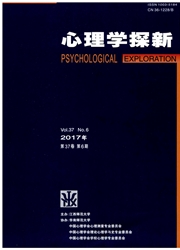

 中文摘要:
中文摘要:
本研究以319名初中生为被试,考察群际背景中,个体对圈内和圈外的规范者和偏常者的评价模式,探索白乌鸦效应的稳定性。研究结果表明:(1)在同一群体内,个体评价偏常者总是高于规范者,这与国外研究不一致;个体评价圈内规范者高于圈外规范者,评价圈外偏常者高于圈内偏常者,这与以往研究的白乌鸦效应一致;(2)随着偏常成员偏离忠诚的程度加剧,个体对规范者的评价更积极,对偏常者的评价更消极;(3)随着群际偏见提高,个体对圈内规范者的评价提高,对圈内偏常者的评价下降,对圈外成员的评价不受群际偏见影响。
 英文摘要:
英文摘要:
Using 319 midde school students in the second year as subjects,this study examines how individuals evaluate normative and deviant members from the in- group and the out- group. The results indicate that,individuals evaluate deviant members more positively than normative members when they evaluate members from the same group,which is inconsistent with foreign research. And individuals evaluate in- group normatvie members more positively than out- group counterparts while they evaluate out- group deviant members more positively than in- group counterparts,which is consistent with past research with the black sheep effect. As the deviant member deviates further from the group norm of"loyalty",individuals enhance their positive evaluation of normative members while lower their evaluation of the deviant member. As individuals' intergroup bias increase,they evaluate normative members more positively and assess deviant members more negatively while intergroup bias doesn't affect children's evaluation of out- group members.
 同期刊论文项目
同期刊论文项目
 同项目期刊论文
同项目期刊论文
 期刊信息
期刊信息
